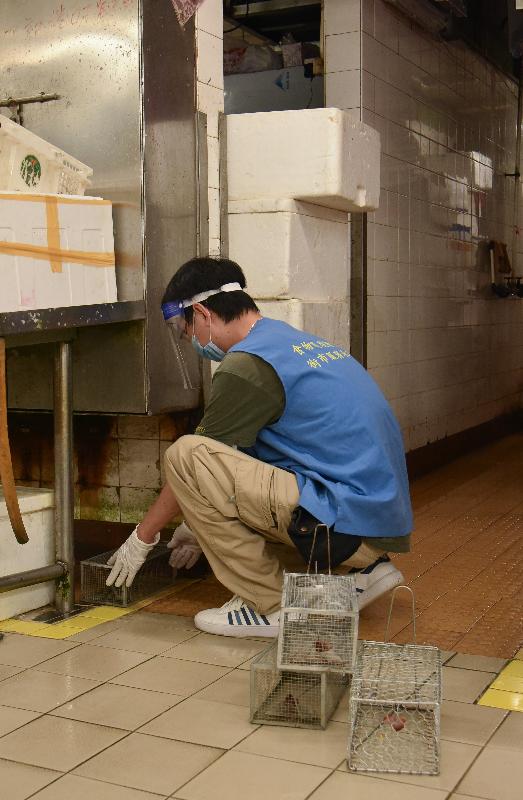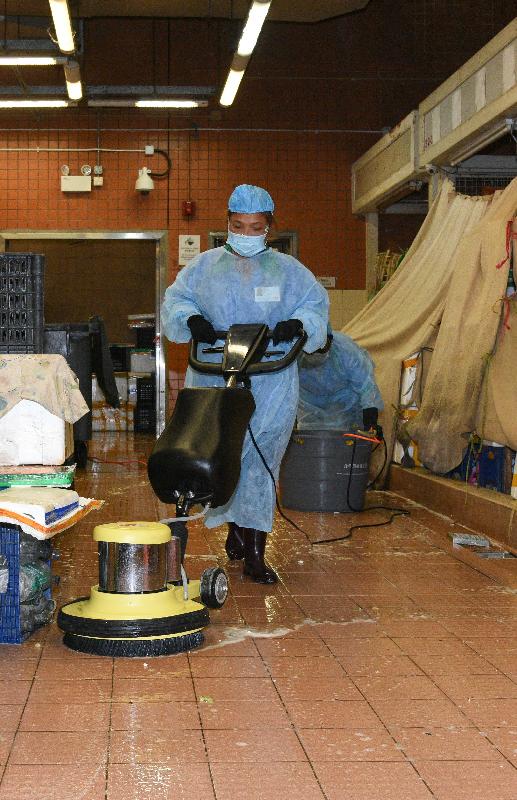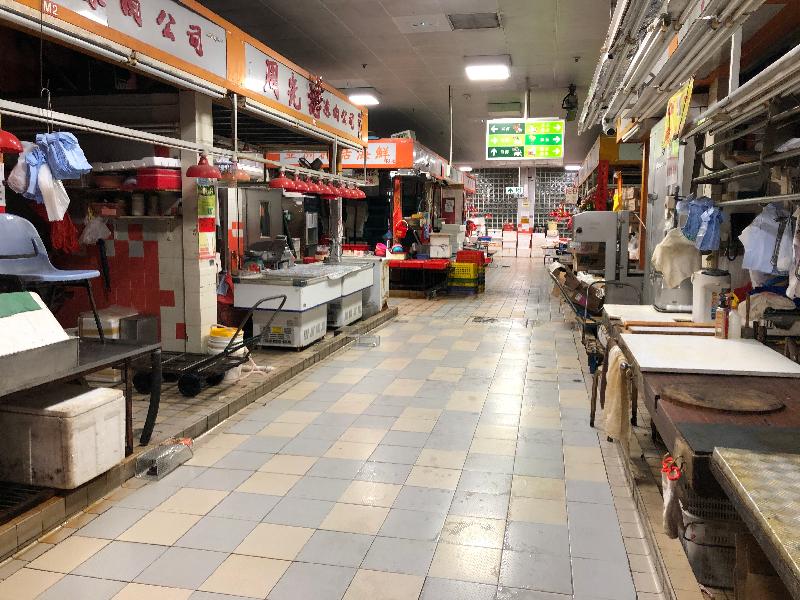FEHD allocates additional resources to enhance anti-rodent work and cleaning and disinfection in markets (with photos)
The Food and Environmental Hygiene Department (FEHD) said today (September 30) that the FEHD has all along been concerned about the hygienic condition of public markets. To safeguard the health and safety of market stall tenants and the public, the FEHD will allocate additional resources to further enhance the anti-rodent work and cleaning and disinfection in its markets.
The FEHD spokesman said that, to strengthen the anti-rodent work, intensive anti-rodent operations have been completed or initiated in 11 FEHD markets, including Lai Wan Market, Ap Lei Chau Market, Kam Tin Market, Lockhart Road Market, To Kwa Wan Market (the second round operation has started), Sha Tin Market, Yue Kwong Road Market, Hung Hom Market, Ngau Chi Wan Market, Tai Shing Street Market and Quarry Bay Market. Having regard to the experience and the effectiveness of the operations, and the views of international rodent infestation experts, the FEHD will allocate additional resources to progressively extend the intensive anti-rodent operation to most of its markets. The first phase of the operation will start in October and cover the markets with a high patronage rate in Wong Tai Sin District, Yau Tsim District, Mong Kok District, Sham Shui Po District and Kowloon City District.
Each intensive anti-rodent operation lasts for three months, during which market staff will thoroughly clear the refuse and clean the passageways and drains in the markets every night after the markets are closed so as to eliminate the food sources of rodents. Plentiful traps will also be placed in market areas extensively in the small hours in order to strengthen rodent control. The FEHD will also proactively encourage market stall tenants to complement such efforts, including conducting cleaning and disinfection at their respective stalls, clearing of their disused articles and put their goods (especially food items) in proper storage, so that the cleanliness and environmental hygiene of stall areas and communal areas could be maintained, while the food sources and hiding places of rodents could also be eliminated.
In addition, to further strengthen the anti-rodent work in markets and other places, District Environmental Hygiene Offices of the FEHD have approached relevant stakeholders proactively, inviting them to participate in joint anti-rodent operations, among which private market operators and other government departments were invited to take part in joint operations at venues under their purview and the surrounding public places, so as to achieve synergy in strengthening the work on environmental hygiene.
From August this year, the FEHD has conducted joint operations with the Housing Department, the Leisure and Cultural Services Department, public and private market operators, and stepped up the anti-rodent work in the surrounding areas of markets. For one and a half month, over 100 joint operations were conducted with poisonous baits and traps placed at about 7 000 and 2 000 locations respectively, about 250 rat holes destroyed, around 400 dead rodents collected and 300 rodents caught in traps.
The spokesman reminded that according to the Food Business Regulation (Cap 132X), any person engaged in the transportation of food animal carcasses and offal shall adopt appropriate measures to protect the food from risk of contamination or deterioration. Offenders are liable to prosecution and a maximum fine of $10,000 and imprisonment for three months. The FEHD has stepped up inspection on handling of carcasses and offal by relevant food business operators. From mid-August to late September, prosecution procedures were initiated against fresh provision shop licensees/persons-in-charge and public market stall tenants selling meat for breaching the regulation, involving a total of 17 cases.
The FHED had issued letters to licensed fresh provision shops selling fresh meat and public market stall tenants selling meat, reminding them to abide by the relevant requirements. The FEHD has been actively discussing with the trade the arrangements for handling pig carcasses upon their arrival at the markets, reminding them to adopt appropriate measures to protect the food from contamination for food safety, environmental hygiene and rodent control.
The FEHD had also issued advisory letters to operators and permit holders of meat delivery vans of Sheung Shui Slaughterhouse and Tsuen Wan Slaughterhouse, reminding them to adopt appropriate measures to ensure that the food animal carcasses and offal are properly protected from rodent problems during their delivery to shops.
According to recent observation, the trade has already improved the handling of pig carcasses upon their arrival to the markets. The FEHD will closely monitor the situation and take appropriate follow up action as necessary.
Besides, the FEHD has continued to strengthen the cleaning and sanitary work of markets. During the epidemic, to safeguard the health and safety of market stall tenants and the public, the FEHD has further enhanced the anti-epidemic measures in its markets, and the cleaning and disinfection in communal areas and facilities in the markets (including toilets, escalators, elevators and stair handrails). In addition to regular cleaning work in the daytime, the FEHD market service contractors also conduct thorough cleaning in all markets after the markets are closed every day.
Amid the severe COVID-19 epidemic situation in July and August, the FEHD additionally arranged for over 60 public markets to be closed an hour earlier for deep cleaning and disinfection as a precautionary measure to further enhance the anti-epidemic measures in its markets, during which the FEHD thoroughly cleaned and disinfected communal areas and facilities in the markets, and called for co-operation of market tenants to conduct cleaning and disinfection at their respective stalls, with a view to improving the overall hygiene condition of the markets and eliminating the food sources and hiding places of rodents. In addition, the FEHD carried out deep cleaning work on the periphery of the markets and nearby streets.
To sustain its effectiveness, the FEHD has regularised the relevant measure progressively. Most of its public markets, based on their actual circumstances, will be closed an hour earlier for deep cleaning and disinfection once every three months. The first phase will begin in October and cover 18 public markets, including Tang Lung Chau Market, Wan Chai Market, Aldrich Bay Market, Electric Road Market, Aberdeen Market, Tin Wan Market, Tai O Market, Kwun Chung Market, On Ching Road Flower Market, Tai Shing Street Market, Ngau Chi Wan Market, Ngau Tau Kok Market, Shui Wo Street Market, Tai Kiu Market, Tung Yick Market, Shek Wu Hui Market, Luen Wo Hui Market and Tai Wai Market.
According to recent news reports, some market fish stall tenants have provided shared towels at the stalls for use by customers, which may increase the risk of cross infection. To maintain personal, environmental hygiene and protect food safety, the FEHD has issued advisory letters to remind its market fish stall tenants not to provide shared towels, but consider substituting these with disposable tissues if needed. Moreover, tenants have also been reminded to advise their customers not to touch seafood and to assist customers in choosing seafood as far as possible. Meanwhile, the FEHD has also taken the opportunity to issue letters to all market tenants, reminding them about the anti-epidemic measures again.
The FEHD will closely monitor the situation of its markets and enhance cleaning and disinfection work as well as anti-rodent measures when necessary so as to maintain environmental hygiene.



